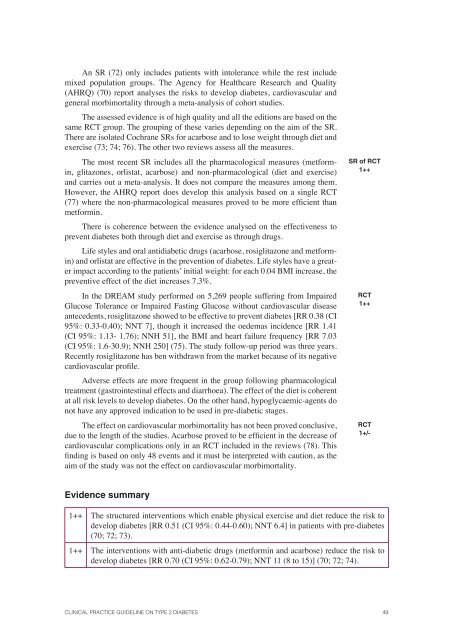2,46 Mb - GuÃaSalud
2,46 Mb - GuÃaSalud
2,46 Mb - GuÃaSalud
Create successful ePaper yourself
Turn your PDF publications into a flip-book with our unique Google optimized e-Paper software.
An SR (72) only includes patients with intolerance while the rest include<br />
mixed population groups. The Agency for Healthcare Research and Quality<br />
(AHRQ) (70) report analyses the risks to develop diabetes, cardiovascular and<br />
general morbimortality through a meta-analysis of cohort studies.<br />
The assessed evidence is of high quality and all the editions are based on the<br />
same RCT group. The grouping of these varies depending on the aim of the SR.<br />
There are isolated Cochrane SRs for acarbose and to lose weight through diet and<br />
exercise (73; 74; 76). The other two reviews assess all the measures.<br />
The most recent SR includes all the pharmacological measures (metformin,<br />
glitazones, orlistat, acarbose) and non-pharmacological (diet and exercise)<br />
and carries out a meta-analysis. It does not compare the measures among them.<br />
However, the AHRQ report does develop this analysis based on a single RCT<br />
(77) where the non-pharmacological measures proved to be more efficient than<br />
metformin.<br />
There is coherence between the evidence analysed on the effectiveness to<br />
prevent diabetes both through diet and exercise as through drugs.<br />
Life styles and oral antidiabetic drugs (acarbose, rosiglitazone and metformin)<br />
and orlistat are effective in the prevention of diabetes. Life styles have a greater<br />
impact according to the patients’ initial weight: for each 0.04 BMI increase, the<br />
preventive effect of the diet increases 7.3%.<br />
In the DREAM study performed on 5,269 people suffering from Impaired<br />
Glucose Tolerance or Impaired Fasting Glucose without cardiovascular disease<br />
antecedents, rosiglitazone showed to be effective to prevent diabetes [RR 0.38 (CI<br />
95%: 0.33-0.40); NNT 7], though it increased the oedemas incidence [RR 1.41<br />
(CI 95%: 1.13- 1.76); NNH 51], the BMI and heart failure frequency [RR 7.03<br />
(CI 95%: 1.6-30.9); NNH 250] (75). The study follow-up period was three years.<br />
Recently rosiglitazone has ben withdrawn from the market because of its negative<br />
cardiovascular profile.<br />
Adverse effects are more frequent in the group following pharmacological<br />
treatment (gastrointestinal effects and diarrhoea). The effect of the diet is coherent<br />
at all risk levels to develop diabetes. On the other hand, hypoglycaemic-agents do<br />
not have any approved indication to be used in pre-diabetic stages.<br />
The effect on cardiovascular morbimortality has not been proved conclusive,<br />
due to the length of the studies. Acarbose proved to be efficient in the decrease of<br />
cardiovascular complications only in an RCT included in the reviews (78). This<br />
finding is based on only 48 events and it must be interpreted with caution, as the<br />
aim of the study was not the effect on cardiovascular morbimortality.<br />
SR of RCT<br />
1++<br />
RCT<br />
1++<br />
RCT<br />
1+/-<br />
Evidence summary<br />
1++ The structured interventions which enable physical exercise and diet reduce the risk to<br />
develop diabetes [RR 0.51 (CI 95%: 0.44-0.60); NNT 6.4] in patients with pre-diabetes<br />
(70; 72; 73).<br />
1++ The interventions with anti-diabetic drugs (metformin and acarbose) reduce the risk to<br />
develop diabetes [RR 0.70 (CI 95%: 0.62-0.79); NNT 11 (8 to 15)] (70; 72; 74).<br />
CLINICAL PRACTICE GUIDELINE ON TYPE 2 DIABETES 49

















